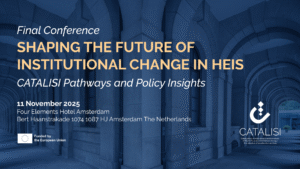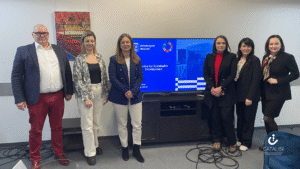
Over 40 stakeholders from across the quadruple helix come together in Cork for a full day workshop to examine what’s needed to support sustainable and best practice research and innovation in the City and region.
Aligned to the University College Corks Institutional Strategy, the EU Horizon Europe CATALISI initiative (Collaboration, Action, Transformation, Adaptation, Learning, Innovation, Sustainability, and Impact) invited stakeholders to deliberate on the topic of ‘Financial Sustainability for Research & Innovation’
University College Cork (UCC) is committed to delivering impactful R&I that addresses societal challenges; transforming research into meaningful policy; and delivering a highly skilled workforce as key enablers of future economic development and national competitiveness.
This workshop initiated dialogue with internal and external stakeholders to explore what’s needed to accelerate transformation towards a more financially sustainable research and innovation ecosystem that enhances excellence and world-class research.
Held on August 2nd 2023, the workshop kick starts a longer-term process for collaborating with stakeholders in Cork, listening to their needs, experience and expertise to understand the current landscape and explore issues, challenges, barriers and the conditions that affect and inform this critical area of university operations and external partnerships.
The UCC CATALISI intervention area ‘Financial Sustainability for Research & Innovation’ directly spans two of the three CATALASI Intervention Domains: namely ‘Research Modus Operandi’ and ‘Finance’, with a strong relationship to the ‘Human Capital’ Domain.
Framing the intervention area, UCC recognize that financial sustainability is integral and related to realizing sustainability in broader terms and within the context of a research and innovation eco-system that interacts at local, regional, national and international levels.
In the morning, a committed and passionate group of internal UCC stakeholders focussed on university operations, while the afternoon provided an opportunity to listen deeply to the diverse perspectives of our external stakeholders.
All participants considered (i) the local context and framework conditions for sustainable research and innovation, (ii) barriers to financial sustainability and (iii) stakeholders needs, values concerns and expectations.
Throughout, facilitated discussions invited critical reflection on the research ecosystem and explored what’s needed to strengthen how it contributes to long-term development of Cork and the wider region, to address climate change, sustainable growth and ensure social cohesion.
Additionally, stakeholders who were unable to attend on the day provided written inputs and many others expressed interest to engage with the ongoing work of the project, reflecting the strong local interest in the CATALISI initiative.
As an output from the workshop, the Cork CATALASI team has collated inputs and feedback into a summary report which includes a high-level SWOT and snapshot of the current context for internal and external conditions. This will be used as a launchpad for further engagement in Autumn 2023, where discussions will begin to ideate and co-create possible solutions and activities to respond to the challenges identified and support transformation towards more sustainable research and innovation.
The workshop was co-led by the UCC CATALASI team, Dr Martin Galvin, Dr David O’Connell, David Hogan and Ciara O’Halloran, together with Joanna Karas from the European Network of Living Labs (ENOLL).



